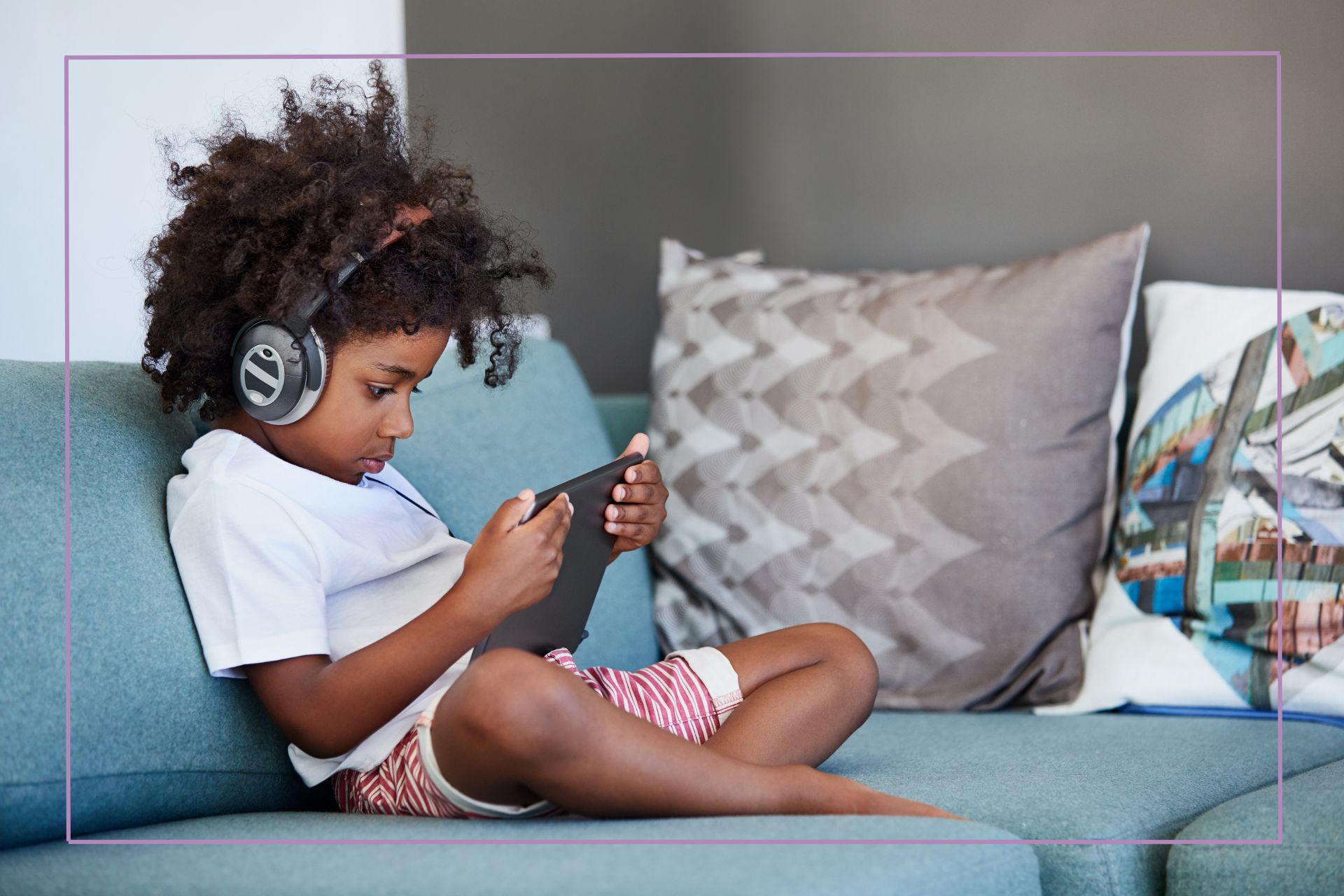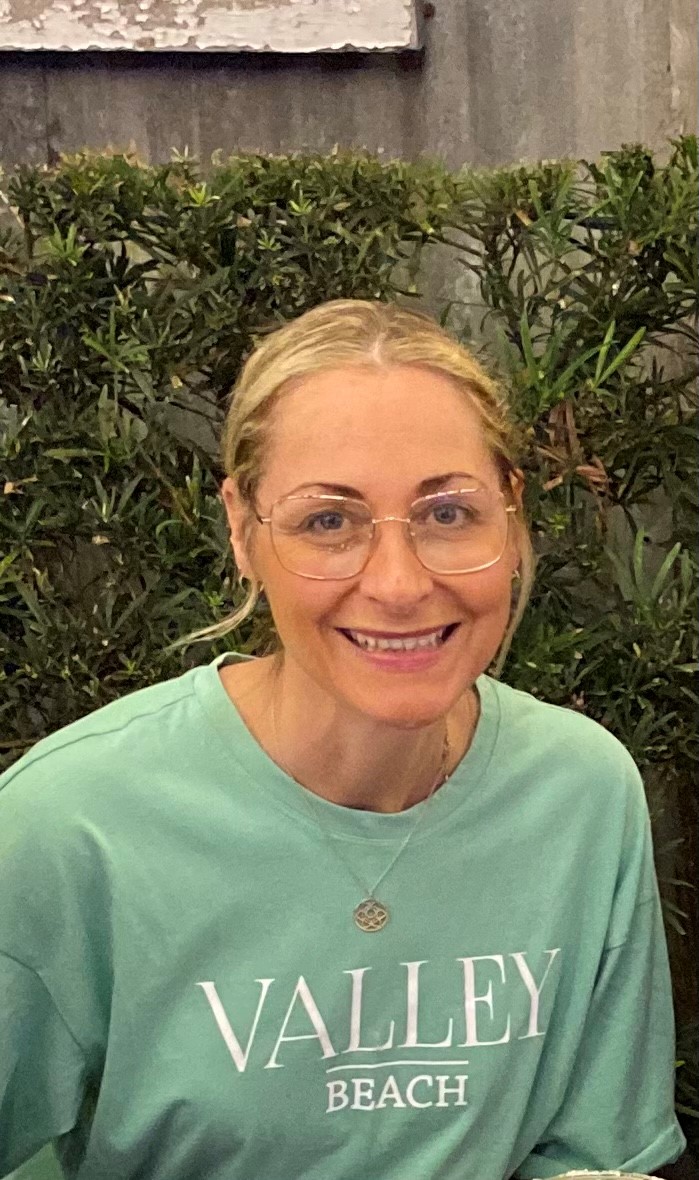How to reduce screen time for kids: 9 simple tips from family therapists and a neuroscientist (and #4 is an easy win)
Creating meaningful boundaries for kids and their screen, is about about intentional use

If you frequently wonder how to reduce your kid's screen time, you are not alone. I don't know about you but my phone feels surgically attached to my hand, I'm not sure my six-year-old has ever seen me without it, to be fair.
Screen time is a huge conversation among parents right now, whether it's how to keep kids safe on social media, or many parents have noticed a change in behaviour if their kids too much screen time. "It drops off a cliff", mum-of-two, Debs told GoodtoKnow, "and the sass skyrockets."
According to a recent Government study a whopping 97% of 12-year-olds have a smartphone. This is why neuroscientist TJ Power is a huge advocate for 'healthy tech' and rebalancing kids' brains, he claims the key priorities for young people to rebalance are sunlight, nature, cleaning, reading and exercise. "if young people get addicted to the quick dopamine [from screens] like us adults are I can't explain how likely they are to experience depression or anxiety or have issues with anger as they grow."
Family therapist, Katie Rose agrees and tells us; "Smartphones have dominated our lives for too long. More recently, there has been a backlash against the explosion in the speed and availability of digital technology, and the impact that it's having on our young people. 77% of parents of primary school-age children back a smartphone ban for under 16's (Parentkind poll, March 2024). Movements like 'Smartphone free Childhood' have sprung up and are quickly amassing thousands of followers.
How to reduce screen time for kids
- Understand why
- Set realistic goals
- Be accountable
- Model good screen time habits
- Be engaged
- Be more intentional with screen use
- Actively put devices away
- Create 'phone-free' zones at home
- Get outside
1. Understand why
Start by explaining to yourself or others why reducing screen time is important. Highlight the negative effects of excessive screen time on physical health, mental well-being, and relationships. Providing this context can make the goal more meaningful and motivate action.
Katie tells us how it has become so difficult for parents these days that technology has developed at a lightning-fast pace in the last 15 years and it's sometimes hard to keep up, and to know what to do for the best. She explains; "Referrals for outdoor accidents have declined dramatically, but instead our children are suffering from anxiety and depression on a scale that was previously unthinkable. Whilst we know how to mend a broken leg, fixing a broken mind is much harder."
She adds; "There is also a risk that as our children grow up, their screen time switches from cutesy TV shows, which are at least carefully curated and edited by professional teams, often involving educational psychologists and other experts, and evolves into youtube and social media, where we have less and less control over what our children see. Breaking the cycle early is important."
Parenting advice, hot topics, best buys and family finance tips delivered straight to your inbox.
2. Be realistic
It's important to set achievable goals when reducing screen time. Start by identifying specific activities or hobbies you'd like to spend more time on, then gradually decrease screen usage to make room for them. Don't aim for perfection overnight; small, consistent changes lead to lasting habits. Remember, it's okay to slip up occasionally – what matters is getting back on track and staying committed to your goals.
Nicole Green, BACP accredited counsellor and life coach explains how important it is to include your children in this conversation. "Being able to have these open and inclusive conversations around the different types of screen activities will enable our children to feel like they have agency and control to choose how they engage with screens and what they are consuming, with a link to how it is making them feel.
"Informed choice and open discussion will also help to strengthen the relationship we as parents with our children. If we can also be open and honest about our own screen time and then be the change we want to see it will only strengthen our relationship with our children. Aim to explore your child’s thoughts and feelings around their screen usage."
3. Have accountability partners
Find a friend or family member who shares your goal of reducing screen time. Check in with each other regularly to offer support and encouragement. You can also use apps or screen time tracking features on your devices to monitor your progress. By holding yourself accountable and having someone to share your journey with, you'll be more motivated to stick to your screen time limits.
4. Model good habits
Children often mimic the behaviour of adults, so it's essential to model healthy screen habits at home. Limit your own screen time and prioritize face-to-face interactions with family members. Engage in activities like reading, cooking, or playing games together without screens. By demonstrating moderation and balance, you'll instill positive screen habits in those around you.
Katie agrees; "How can we expect our children to spend less time looking at their screens, when we're addicted to endless doom scrolling? At the same time as committing to change for your child, you could also commit to some positive changes for yourself, too. Research shows that time away from your screen in nature reduces the stress hormone cortisol - combining this with physical activity releases feel-good endorphins too."
Heidi tells us how this can also look like discussing the warning signs, and teaching your kids how to notice theirs in their body. "Have discussions about warning signs. Everyone has different signs that indicate they’ve spent too long online. Common signs are headaches, sore eyes, sleepiness and feeling low emotionally. Talk to your children about what these mean and the importance of having time away from screens when they experience them. "
5. Engage in other activities
Instead of mindlessly scrolling through your phone, focus on activities that fully engage your mind and body. Take up a new hobby, join a sports team, or volunteer in your community. Engaging in meaningful activities not only reduces screen time but also enhances overall well-being by fostering connections and personal growth.
6. Intentional screen use
Before reaching for your device, ask yourself why you're using it. Are you checking emails out of habit, or do you have a specific task in mind? Set clear intentions for your screen time and avoid aimless browsing. Designate specific times for checking messages or social media, and use apps or settings to limit distractions during focused work or leisure activities.
"Content is just as important when evaluating screen time as the time spent on the device."
Nicole Green, BACP accredited counsellor and life coach
Nicole tells us; "There is a huge difference between intentional screen time and unintentional screen time. The biggest difference is that the experience of intentional screen time can be shared and is an “active” engagement . By “active” in this context we refer to anything that prompts us to think, respond or do. After engaging in intentional screen time, we feel re charged and it can foster connection – it is very different from the feeling we get after unintentional screen time. With unintentional screen time, we are passive and there is limited if any invitation to engage, to think, or to do. It is an isolated activity and can leave us feeling drained and disconnected."
Heidi agrees, and also suggests 'family agreements' to help with intentional screen use. She tells us; "Collaboration is key when trying to change your children’s behaviour. Get them on board with a ‘family agreement’ about what limits you will be following. Discuss why these are important and how the family can help each other to stick to them. "
7. Put devices away
Make it easier to resist the temptation of screens by physically removing them from your immediate environment. Create designated charging stations outside of bedrooms and meal areas to discourage mindless scrolling. When spending time with others, prioritize face-to-face interactions by keeping phones out of sight and out of mind.
Nicole tells us; "Implement boundaries and ground rules together. Your child will feel more secure and safe with clear rules and boundaries around devises. Boundaries harness feelings of security and as much there may be initial protests. Being able to place rules and stick to them will relieve feelings of anxiety and force your child to find other ways to entertain themselves. Put rules in place earlier to save pain in the long term. If they are older and you are worried about their screen time, then there are a few tips that you could suggest and discuss with them to reduce the time on screens. A good start to setting some ground rules for everyone in the family might be:
- No screens at meal times
- No screens before bed time
- No screens in the bedroom
- Delay touching screens as soon as you wake up and take 10 minutes to consider the day ahead and set an intention for the day
8. Create phone-free zones
Designate certain areas of your home, such as the dining room or living room, as 'phone-free' zones. Encourage family members to leave their devices in a designated spot before entering these areas to promote meaningful conversations and quality time together. Establishing clear boundaries helps create a healthier balance between screen time and real-life interactions.
9. Get outside
Spend more time outdoors to naturally reduce screen time and reap the benefits of fresh air and physical activity. Take leisurely walks, go for a bike ride, or explore local parks with friends and family. Not only does outdoor time provide a welcome break from screens, but it also supports physical and mental well-being.
Nicole explains how encouraging family time and getting outside is important. "It could be as simple as all going for a walk, or watching a film together that you can all engage in and contribute to. Encourage your child to help out with preparing a family meal or for them to prepare and shop for a meal of their choice. Encourage other hobbies not related to screens, ideally ones that will take your child outside of the house."
How to evaluate screen time
With technology not only advancing but also being used more in schools and throughout the day, the current guidelines recommend that children aged between 5 and 17 have no more than two hours per day on a screen.
Nicole Green, BACP accredited counsellor and life coach tells us; "A way to evaluate kids screen time is to firstly look at what they are consuming or viewing as not all apps are the same. Monitoring what they watch, or how they are engaging with their screen, will be the first thing that should happen."
She explains how content is just as (if not more) important when evaluating screen time as the time spent on the device. "This is where the conversations around concerns and links to emotional wellbeing need to happen between parent and child in a relaxed and non-judgmental way. If approached with compassion and enquiry your pre-teen or teen will be more likely to open up about their own concerns about their screen time usage and feelings around this."
Questions to consider when addressing issues around screens:
- How do your children act when the screen is turned off?
- How does watching/using the screen make them feel?
- What is the general climate like around screen us in your home?
- Are screens causing problems or issues in areas of your child’s life or daily routines.
- Have screens become all consuming?
Nicole goes on to say; "We as parents also need to be honest with ourselves about our own screen time habits, and then ask yourself how much your screen time is impacting family time and dominating your own leisure time."
The therapist explains how children will often tell her that they want to talk to their parents more, or do more family activities, but it’s not just their own screen time that is preventing this, it’s also that of their parents’ screen time that is causing barriers to communication.
Other helpful resources to try
Neuroscientist Tj power's Instagram has lots of helpful tips and advice to try.
A post shared by Tj Power | Neuroscientist
A photo posted by tjpower on
If you're looking to make changes and need some back up then take a look at smartphonefreechildhood on instagram
A post shared by Smartphone Free Childhood
A photo posted by smartphonefreechildhood on
Take a look at the Inernetmatters.org youtbe video on how to reduce children's screen time
Our expert panel

Nicole Green is an experienced therapist, counsellor and life coach. She has worked in private practice for many years as well as with a bereavement agency helping adults as well as children and young people negotiate their way through the difficult path of loss and bereavement. She provides training and runs courses for parents and teachers as well as providing therapy to secondary schools. She is a registered and accredited and Member of the British Association for Counselling and Psychotherapy

Katie Rose is a BACP registered and qualified therapist, and founder of TherapEast, a therapy centre in east London. She specialises in working with adult survivors of childhood trauma, giving clients the time and space to process difficult childhood experiences, and understanding the impact that their past has on their present, in order to help them to achieve amazing changes. As a parent and foster parent she understands the impact that early parenting has on child development, shaping the way that we navigate the world as an adult.

Heidi Soholt is a highly experienced BACP accredited psychotherapist who specialises in helping with children and adults overcome a wide range of issues - including anxiety, low self-esteem and peer difficulties. Heidi has a private therapy practice based in Stirling (Scotland) but also provides remote online support to clients worldwide. She is also a school counsellor and works with children aged 4 to 11. Heidi takes a child-centred, play based approach in order to support the children she works with.
Keep up to date with other family news like don’t want your kids to grow up too fast? Science says this parenting style is the way to go and asking your kid this question could do wonders for their self-esteem – here’s why, as well as why you shouldn't tease your child about having a ‘boyfriend’ or ‘girlfriend’, according to parenting experts.
Stephanie has been a journalist since 2008, she is a true dynamo in the world of women's lifestyle and family content. From child development and psychology to delicious recipes, interior inspiration, and fun-packed kids' activities, she covers it all with flair. Whether it's the emotional journey of matrescence, the mental juggling act of being the default parent, or breaking the cycle of parenting patterns, Stephanie knows it inside out backed by her studies in child psychology. Stephanie lives in Kent with her husband and son, Ted. Just keeping on top of school emails/fundraisers/non-uniform days/packed lunches is her second full-time job.
